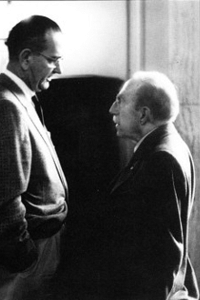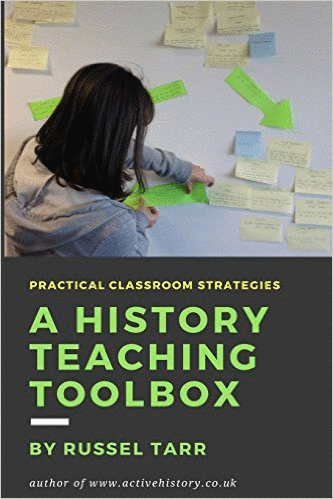 Introduction
Introduction
Lyndon Baines Johnson (1908-73) had been JFKs vice-president, appointed to the position because he was a masterful manager of congress with a remarkable ability to get things done. By turns brash, charming, coarse and cloying, he was a fascinatingly complex, larger-than life figure. In many ways he could not have been more different to Kennedy, a suave millionaire playboy with whom he had a predictably prickly relationship: Johnson, a devoted family man, came from a poor background, never lost his thick Texas drawl, and was very insecure about his lack of formal education.
After the 1964 election, the Democrats held two-thirds majorities in both houses of Congress. This gave Johnson the mandate to realize his vision of a “Great Society”. Emboldened by his election by more votes than any president in history, Johnson prepared to inundate the 89th Congress with a flood of legislative proposals.
Johnson declared a "war on poverty" and challenged Americans to build a "Great Society" that eliminated the troubles of the poor.
By 1965, Johnson had devised and signed into law more than 200 pieces of major legislation, including a sizable tax cut, a billion-dollar anti-poverty programme, and a ground-breaking civil rights bill.
Current-day relevance
The debate over the proper size and role of the federal government is a distinctly American one. In no other country has that question been argued for so long and with such intensity, going all the way back to Alexander Hamilton (who wanted a powerful central authority) and Thomas Jefferson (who feared one).
Virtually every political battle that rages today has roots in the federal expansion and experimentation that began in the 1960s. It set terms of engagement for ideological warfare over how to grapple with income inequality, whether to encourage a common curriculum in schools, affirmative action, and immigration. Poverty remains with us, with the two parties in deep disagreement over whether government has alleviated it or made it harder to escape.
LBJ: An Introduction
In this worksheet, students are given an overview of LBJ and his famous 'treatment', along with video clip links and an extract from an acclaimed biography of the President. From this they are encouraged to identify five key aspects of the "Johnson Treatment" and substantiate each with an extract from the reading.
Video Task: Overview of the Great Society: Video 1 (8m) | Video 2 (10m)
After the 1964 election, the Democrats held two-thirds majorities in both houses of Congress. This gave Johnson the mandate to realize his vision of a “Great Society”. Emboldened by his election by more votes than any president in history, Johnson prepared to inundate the 89th Congress with a flood of legislative proposals. Johnson declared a "war on poverty" and challenged Americans to build a "Great Society" that eliminated the troubles of the poor. By 1965, Johnson had devised and signed into law more than 200 pieces of major legislation, including a sizable tax cut, a billion-dollar anti-poverty programme, and a ground-breaking civil rights bill.
Individual Research Task: 27 Acts of Legislation
Each member of the class will be given ONE card, and should research the law listed on it to make notes on the following:
What problem was it trying to solve?
What did it try to do to solve this problem?
Was it a success or a failure?
Group Feedback Phase | Teacher Notes
The class will be organised into small groups of about four or five students.
Each group should start by discussing the “Education / Workers' rights” row. Any member of the team who researched any of these laws should share their findings with the rest of the group, and all members should write points as appropriate in the relevant cells of the row.
When this discussion has run its course, repeat this process for the remaining rows.
Any team that finished ahead of the others should start on the homework task (making notes from the articles about LBJ’s reforms and adding appropriate points to the table).
Finally, your teacher will “jigsaw” the groups so that a second round of discussion can take place which ensures that ALL of the relevant legislation is considered (e.g. each member of the team is given a letter - A, B, C, D - and then new groups are formed with people of the same letter).
Plenary Video [1] - An assessment of the Great Society
Students should watch this excellent 12-minute video documentary and develop their notes accordingly.
Historiography and Essay Writing | completed teacher notes
"Read the concluding statements you have produced regarding each of the main policy areas you have considered to arrange them in a continuum line from least to most successful. If you were going to arrange these into three broad categories as sections for an essay, what would your new overall topic sentence be for each of them?"
Next, research the following four recently published books and use your knowledge to complete this table to ensure you have some clear historiography to work into your essay.
Model Essay: How successful were Johnson's Great Society reforms?
An essay written in timed conditions by Russel Tarr, author of this website.
Plenary Video [2]
Watch the video clip of Paul Ryan criticising the War on Poverty. How would Johnson perhaps respond to these criticisms?

© 1998-2026 Russel Tarr, ActiveHistory.co.uk Limited (Reg. 6111680)
1 Torrin Drive, Shrewsbury, Shropshire, SY3 6AW, England
Privacy Policy | Contact






